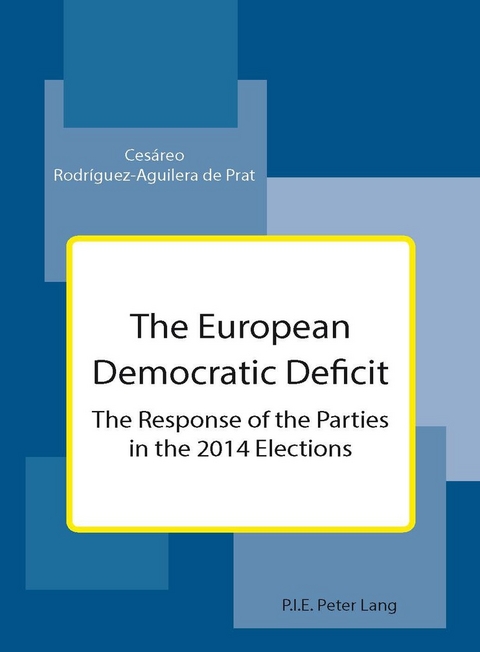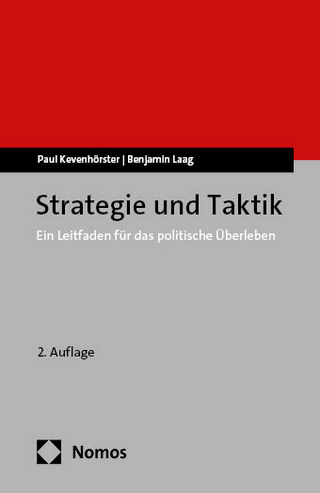
The European Democratic Deficit
The Response of the Parties in the 2014 Elections
Seiten
2016
|
New edition
Peter Lang AG, Internationaler Verlag der Wissenschaften
978-2-87574-363-3 (ISBN)
Peter Lang AG, Internationaler Verlag der Wissenschaften
978-2-87574-363-3 (ISBN)
- Titel z.Zt. nicht lieferbar
- Versandkostenfrei
- Auch auf Rechnung
- Artikel merken
The book evaluates the positions and proposals of the parties in the six most populous countries that have addressed the EU’s so-called «democratic deficit» through a comparative analysis of their political programmes.
The «never-ending crisis» that started in 2008 and the technocratic and fiscal measures demanded by the «Troika» have aggravated the EU’s so-called «democratic deficit» more than ever before. In this essay the principal theoretical and practical dimensions of this phenomenon at the levels of institution, procedure and social legitimacy are set out and developed. With this in mind, the dysfunctions in the architecture of the institutions, the elite, complex and opaque mechanisms in decision-making and, most importantly, the growing critical estrangement of many citizens reveals that poor democratic quality of the EU constitutes its principal and most serious political problem. To empirically illustrate this debate, Rodríguez-Aguilera evaluates the positions and proposals of the parties in the six most populous countries that have addressed this issue through a comparative analysis of their political programmes.
The «never-ending crisis» that started in 2008 and the technocratic and fiscal measures demanded by the «Troika» have aggravated the EU’s so-called «democratic deficit» more than ever before. In this essay the principal theoretical and practical dimensions of this phenomenon at the levels of institution, procedure and social legitimacy are set out and developed. With this in mind, the dysfunctions in the architecture of the institutions, the elite, complex and opaque mechanisms in decision-making and, most importantly, the growing critical estrangement of many citizens reveals that poor democratic quality of the EU constitutes its principal and most serious political problem. To empirically illustrate this debate, Rodríguez-Aguilera evaluates the positions and proposals of the parties in the six most populous countries that have addressed this issue through a comparative analysis of their political programmes.
Cesáreo Rodríguez-Aguilera de Prat is Professor of Political Science at the University of Barcelona. Author of a wide selection of works dedicated to comparative politics and political theory, his current research is centred on political parties and European integration.
Contents: EU’s democratic deficit – Evaluation of the positions and proposals of the parties of the EU’s six most populous countries – Theoretical and practical dimensions of the EU’s democratic deficit at the levels of institution – Social legitimacy.
| Erscheinungsdatum | 06.06.2016 |
|---|---|
| Verlagsort | Pieterlen |
| Sprache | englisch |
| Maße | 150 x 220 mm |
| Gewicht | 240 g |
| Themenwelt | Sozialwissenschaften ► Politik / Verwaltung ► Allgemeines / Lexika |
| Sozialwissenschaften ► Politik / Verwaltung ► Politische Systeme | |
| Sozialwissenschaften ► Politik / Verwaltung ► Politische Theorie | |
| Sozialwissenschaften ► Soziologie | |
| Schlagworte | democratic deficit • Evaluation: EU • Levels of institutions • Social legitimacy |
| ISBN-10 | 2-87574-363-5 / 2875743635 |
| ISBN-13 | 978-2-87574-363-3 / 9782875743633 |
| Zustand | Neuware |
| Haben Sie eine Frage zum Produkt? |
Mehr entdecken
aus dem Bereich
aus dem Bereich
ein Leitfaden für das politische Überleben
Buch | Softcover (2024)
Nomos (Verlag)
CHF 39,95


